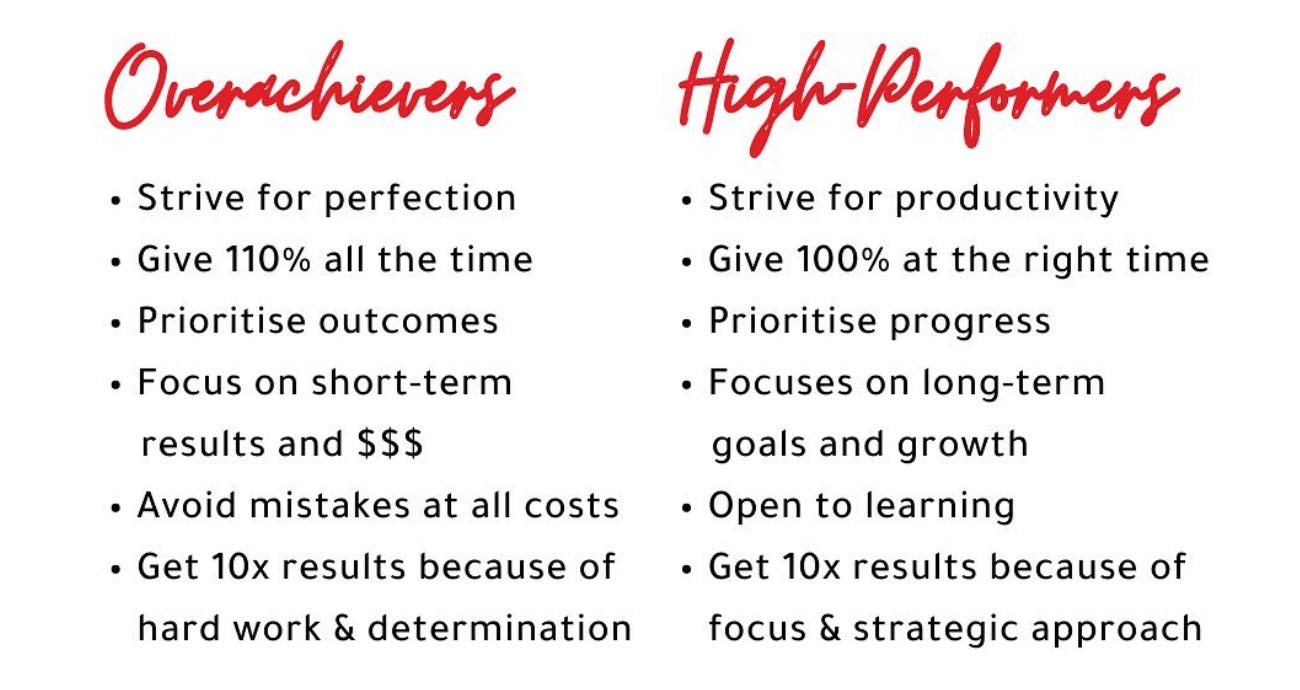The difference between being a high-performer and an overachiever is subtle, but the impact is drastic.
Both can have impressive resumes.
Both can be counted on to get the job done.
Both can be incredibly capable and committed.
The question you should be asking right now is, “where do I see myself in this equation?”
Achieve vs. Perform
Achieve comes from an old French word meaning, "bring to a head." And that’s exactly what (over)achievers do. They bring things to a head and they get things done.
Sometimes it’s pretty to witness, sometimes not, but one way or another, overachievers make things happen – no matter what.
Perform also originates from a French word but its meaning is completely different. It means to complete something through alteration. Hence, actual high-performers aim not just to bring something to a head, but to transform it for the better.
Did you notice that? The difference is subtle, but the impact is drastic.
In practical terms, the impact of being an overachiever is costly and harmful on a personal level. The nuance is found in the aftermath of the results...
🏃♀️ Both have the ability to go the extra mile and achieve lofty goals… BUT only overachievers will exhaust themselves and burn out.
🔨 Both can push constantly against the limits of possibility… BUT only overachievers will chase success for the sake of it.
🙋♀️ Both can get things done by themselves without help… BUT only overachievers will fail to include others when needed.
🥇Both can outcompete others and be the best... BUT only overachievers will try to win at all costs.
The truth is overachievers sacrifice much more of their fulfilment and sanity than they need to.
The overachiever profile I see in my work is an incredibly smart and driven individual who pushes themselves to work harder and climb higher to (secretly) fill the inner void of wanting to be seen and valued - even if it makes them exhausted, unfulfilled, and resentful.
Have you ever felt this way before?
You see, overachievers always look for the winning approach. In the short term, through sheer drive and determination, they can be very successful, but there's a painful side to the achievement motive.
But high-performers look for the optimal approach - they do not operate from the need to feel valued. They know their value and worth, and they do not fear failure.
“I feel like being a prisoner in my own cage.”.
Those are the words I would hear regularly from driven, ambitious individuals who ultimately wanted to be set free. Maybe you've thought this too?
Last week I had a Kickoff Day with a new client and I wanted to relate their story to you especially if you suspect you are an overachiever.
This individual triumphed by every traditional metric...
Their resume? Impressive.
Their apartment? Lovely!
Boyfriend? Kind and handsome.
Their life? Not so great.
After years of grinding long hours and putting the rest of their life on the back-burner, they were beyond exhausted. And they persisted until they crashed – physically and mentally, forced to take a sabbatical.
Sure, they read countless self-help books. And yes, some of them helped temporarily. But stress, overthinking, perfectionism, please-pleasing… all of the overachievement tendencies continued to lurk in their life.
You see, when you are used to obsessing about over achievement and pushing harder your inner dialogue becomes hard-wired to your own “should” box.
The only permanent solution is to become aware of your blind spots, pull out the “shoulds,” and shed light on them.
Sit with this quote for a minute or two,
“Until you make the unconscious conscious it will direct your life and you will call it fate.”
- Carl Jung
The good news is that this individual is now committed to defining what success really means to them and creating new ways of living and working accordingly. Now, what about you?
What do you WANT in life but don't have?
What do you HAVE in your life but DON'T want?
What comes up for you when you think about that?
Love,
Aleks



